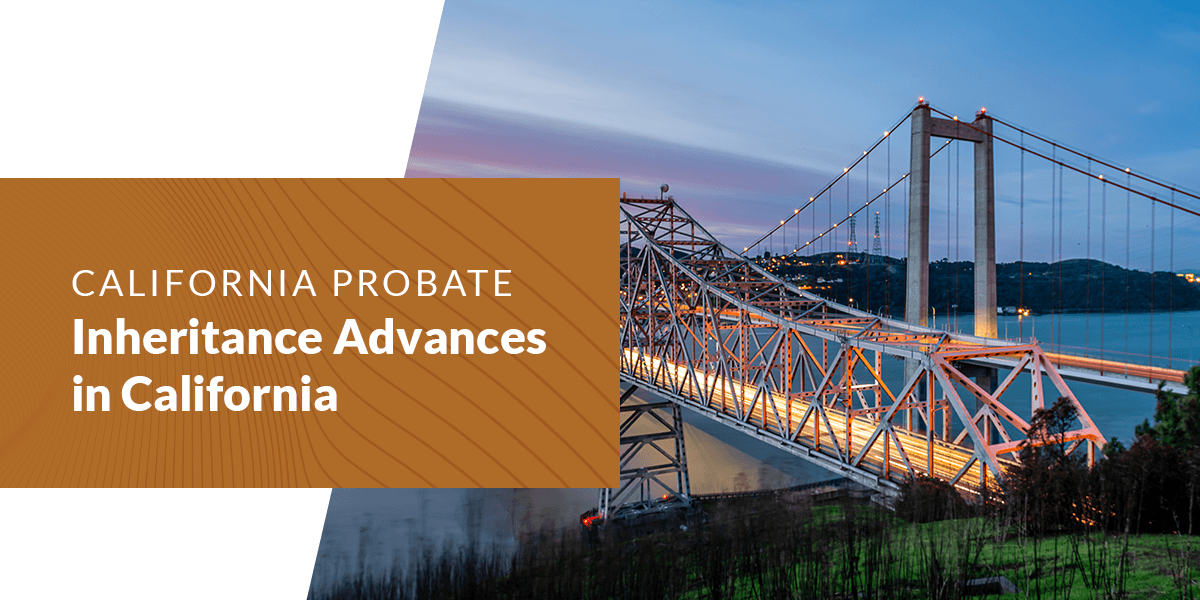California Probate Resources | Inheritance Advances in CA

As an heir, you want to use your inheritance money today. At Inheritance Funding, we’ll help you avoid the Probate Court process and collect your inheritance without complications or delays. As the oldest and largest probate cash advance provider in the industry, you can trust us to help get you your money fast.
The California Probate Process
When a loved one passes away and leaves an inheritance, the heir must go through California probate. Probate is the legal process involved in distributing the deceased’s assets to the appropriate inheritors. How does probate work in California?
- An heir files a petition and will with the court within 30 days of the death.
- The court determines the executor, or personal representative. The descendant may have also listed an executor on their will.
- The executor determines beneficiaries and secures assets and their values for the court.
- The estate must notify creditors.
- The executor pays outstanding debts and taxes, files taxes and pays other claims.
- The estate is requested to be closed. After its closure, the executor gives heirs any remaining assets.
The probate rules in California may seem straightforward on the surface. However, they’re quite complicated and can take months and even years to settle. California probate involves many delays, preventing you from receiving your money and using it how you wish.
Is Probate Required in California?
California law requires probate for most estates. In most cases, an executor must file a petition for probate and any will in the county court where the deceased person lived.
However, you can skip the probate process depending on the size of the estate, type of property and the named beneficiary’s relationship to the descendant. California probate law outlines a simplified process for small estates with less than $166,250 in assets. This simplified process can only be used to transfer personal property — real estate, joint-owned property and vehicles are not covered under the streamlined procedure.
An heir of a small estate may transfer personal property with an affidavit if at least 40 days have passed since the death. Many banks, lawyers or court self-help centers have a particular form you can fill out, as some organizations may have their own affidavit. All heirs must sign an affidavit before giving it to the organization that currently has the property.
A family may also bypass the probate process if their deceased loved one has set up a living trust and named a successor trustee. As a successor trustee, an heir must transfer property ownership to themself as the new trustee.
How Long Does Probate Take in California?
Creditors have four months to make a claim against an estate. Therefore, the probate process must last a minimum of four months. However, California probate typically takes upward of nine months. Depending on the estate’s size, the number of beneficiaries and whether the court contests the will, probate can take anywhere from 18 months to three years.
Under California law, the probate process must be completed within one year from the date the court appoints an executor or administrator. However, these entities can file for an extension if they need to resolve complications or disputes. Situations that can cause delays include issues with the beneficiaries or if the decedent dies without a will.
Certain types of properties that the decedent owned or had an interest in can also delay the process. For example, if the decedent was a business owner and owed money on a piece of real estate, the executor could only distribute the available equity.
How Much Does Probate Cost in California?
The estate’s gross value is a primary factor when determining the cost of probate in California. In 2023, the state established the following statutory fee structure:
- For the initial $100,000: 4% of the value
- For the succeeding $100,000: 3% of the value
- For the next $800,000: 2% of the value
- On the succeeding $9,000,000: 1% of the value
- On the next $15,000,000: 0.5% of the value
The court will determine the appropriate compensation for any estate valued above $25,000,000. The state does not factor in any estate debts when determining value for fee calculation purposes. Instead, it uses the gross value of all probate-eligible assets.
Because the attorney and executor are both subject to the same fee structure, they will receive an identical amount for their services.
Other costs are associated with probate besides the statutory probate fees. Examples include the delivery of the will to the court and the search for estate documents.
How Do You Avoid Probate in California?
The probate process can be long and stressful. After the death of a loved one, your family already has numerous responsibilities to handle. Therefore, many people seek ways to skip the California probate process.
An asset may not need to go to the courts if:
- An asset like a life insurance policy, retirement plan or bank account already has a named beneficiary.
- Real estate or vehicles have a transfer-on-death, or beneficiary, deed.
- The property is in a living trust.
- Two people own an equal share of the property together, also called joint tenancy. In this instance, the surviving owner gets the property.
- Payable-on-death (POD) bank account designations, in which a descendant dictated a beneficiary for an account before death.
You can also receive a probate cash advance to receive your inheritance faster. A probate cash advance is not a loan, as there’s no interest, and you won’t have to make monthly payments to settle the estate. And you’ll never be personally responsible for repayment like you’d be with a probate loan. After you get the money your loved one meant for you to have, you’re free to use it however you want.
How Long Do You Have to File Probate After Death in California?
You must take a will to the probate office within 30 days of death. An executor who fails to file the will within 30 days waives their right as executor. California probate code also maintains that the executor must file a final distribution petition within a year. However, this process may take longer in the instance of a dispute.
Other deadlines to watch out for include:
- Contesting an executor: An heir can only contest a descendant’s executor before the initial hearing by filing a written objection.
- Response to will contestations: Heirs can respond to individuals who contest a will for 30 days after receiving the court summons.
- Petition to revoke probate: Heirs have 120 days after the will is submitted to the court to petition to revoke the probate process.
- Spousal right to dispose of community property: A descendant’s spouse must wait 40 days after death to file.
What Happens If Someone Dies Without a Will in California?
According to California intestate succession laws, if a California resident dies without a will, the state then decides the descendant’s beneficiaries. Intestate successor laws only determine beneficiaries for assets that the will would have governed. Valuable assets like life insurance proceeds, retirement account funds, property with transfer-on-death designations and jointly-owned property are not decided by intestate succession laws.
The court decides the following people will receive a descendant’s assets if they die with:
- Children and no spouse: The descendant’s children will inherit all assets.
- Spouse but no children, nieces, nephews, siblings or parents: The descendant’s spouse will inherit all assets.
- Parents and no spouse or siblings: The descendant’s parents will inherit all assets.
- Siblings but no spouse, children or parents: The descendant’s siblings will inherit all assets.
- A spouse and one child or grandchild: The descendant’s spouse will inherit half of their shared, or community, property and half of their separate property.
- A spouse and multiple children: The descendant’s spouse inherits all community property and one-third of their separate property. Their children will inherit the other two-thirds of the descendant’s individual property.
- A spouse and parents or siblings: The descendant’s spouse inherits all community property and half of their separate property. Their parents or siblings will inherit the other half of the descendant’s separate property.
How to Determine Next of Kin in California
Identifying the decedent’s next of kin can be a crucial step in the probate process. In California, the “next of kin” term refers to individuals that the law has determined to have the right to inherit the decedent’s assets.
California law indicates that the next of kin consists of these individuals in the following order:
- Spouse or registered domestic partner
- Children
- Grandchildren
- Parents
- Siblings
- Nieces and nephews
- Grandparents
- Aunts or uncles
- Cousins
Determining next of kin in a California probate situation requires going down this list until discovering a living individual in the specific category. You can only go to the subsequent category if no one in the previous category survived the decedent.
Under California law, next of kin are the same as intestate heirs — individuals eligible to inherit if the decedent dies without a will.
Steps to Settling an Estate in California
The estate settlement process in California involves following these steps:
- Determine the estate representative: If the decedent died with a will, the representative is the executor named in the document. If there is no will, the priority list established under California law will guide this process.
- Gather information: The estate representative will begin to collect relevant documents and other information and start fulfilling essential duties like taking possession of the property, locating the will, obtaining certified copies of the death certificate and acquiring assets and death benefits.
- Identify the heirs and beneficiaries: The terms of the will — or state law if there is no will — and other estate planning documents typically provide this information.
- Make an inventory of the decedent’s property: Identify and list everything the decedent owned. Include real property, which is land and everything on it, like houses and outbuildings, as well as personal property, which consists of tangible items like jewelry, automobiles and furniture. You should also list intangible items like stocks and bonds.
- Determine the most appropriate asset transfer process: Depending on the situation, the procedure for transferring the decedent’s property to heirs or beneficiaries could be straightforward or require going through probate court to resolve the matter.
Does California Have an Inheritance or Estate Tax?
California does not have an estate or inheritance tax. With an inheritance tax, individual beneficiaries pay inheritance tax after receiving assets. An estate tax is different in that the state taxes an estate before heirs receive any assets. However, you may still have to pay the federal estate tax if the estate’s value is more than $12,060,000 in 2022. You must submit a federal estate tax return within nine months of a person’s death.
Spouses in California Inheritance Law
How much of a descendant’s assets a spouse will get depends on whether their property is considered community or separate property. While someone acquires community property after marriage, spouses may have separate personal property from before the marriage.
Spouses may streamline the probate process by using the Spousal or Domestic Partner Property Petition (Form DE-221). This form will allow a spouse to get a court order that declares their share of the community property and what percentage of their partner’s property belongs to them. If spouses have been married for a long time, they may have almost all community property, avoiding a complicated probate process.
How Can You Get Access to Inheritance Money in California Immediately?
With California probate being so slow and lengthy, it’s normal to feel frustrated. It’s your money, so why should you have to wait to use it? Probate involves many setbacks, but there’s a way to forego the process altogether and get your cash fast.
Probate cash advances are the solution to receiving your inheritance in California. At Inheritance Funding, we make getting your advance as stress-free and straightforward as possible. All you have to do is give us some basic information about your inheritance and let us know how much money you want from the estate. Then, we’ll walk you through some simple paperwork and send you your cash within 24 hours. You have total freedom to use your money how you want, when you want.
Where in California Can You Get an Inheritance Advance?
We get you your probate advance as quickly as possible, no matter where you live. We provide our service in every county in California, including:
- Los Angeles County
- San Diego County
- Orange County
- Riverside County
- San Bernardino County
- Santa Clara County
- Alameda County
- Sacramento County
- Fresno County
- San Francisco County
- & all others!
Get an Inheritance Advance in California Today
If you think receiving an inheritance in California seems like a complicated and lengthy process, you’re right. You can avoid Probate Court and get your money fast with Inheritance Funding. We help you get your cash advance when you need it with our simple four-step process, starting with a free consultation and ending with a payout in as little as 24 hours.
As the industry leader in inheritance cash advances, Inheritance Funding is always a step ahead of the competition. We provide a wide range of benefits you can’t get anywhere else:
- Use your inheritance today: You can complete the process quickly and easily by phone or computer in as little as one day.
- Lowest price guaranteed: We’ll beat any other offers from the competition to give you the most affordable price.
- Money for all your needs: You can use your money however you choose — no strings attached.
- No risk of recourse for non-payment: Because this is not a loan, you’ll never be responsible for repayment.
- Not dependent on income or credit: We don’t focus on your income, credit score or employment history.
- Zero hidden fees or monthly payments: We’ll never charge any additional expenses or impact other heirs in the estate.
For over 25 years, we’ve been working with heirs in every state to help them collect their inheritance as quickly as possible at the lowest cost — and we want to do the same for you. Contact us for a free consultation to get started with your probate advance today!
More California Probate Resources:
Why Wait? Get Your Inheritance Now!
To get started,
give us a call directly or fill out the form to receive your free consultation.
 1-800-944-2072
1-800-944-2072
Free inheritance funding consultation








